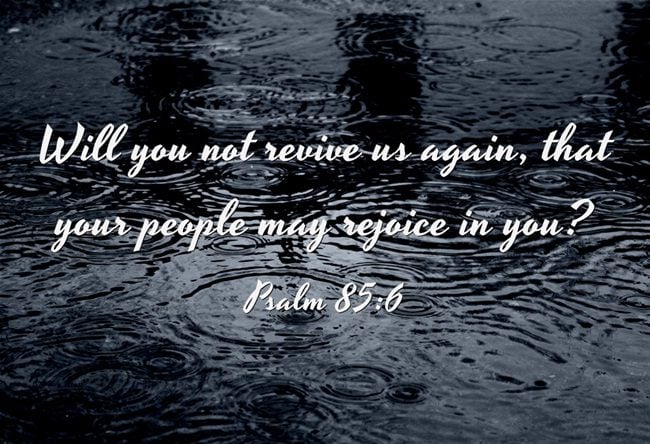Here is a Sunday school lesson or Bible study about revival and what it means.
Where Revival Begins
Psalm 85:6 “Will you not revive us again, that your people may rejoice in you?”
I have heard the best way to start a revival in the church is to take a piece of chalk and draw a circle around yourself. Revival starts in that circle and once revival’s began, it moves outward and other members who are revived begin to move outward toward others before most or all of the church repents and revival has begun. We can’t plan a revival, you can’t schedule a revival, you can’t start a revival; you can advertise it on TV, on the radio, or in the newspapers but only God can bring revival and He starts it within the human heart.
What does it mean to “revive us again?”
Does revival enable God’s people to rejoice in Him?
Can we revive others?
Reviving Others
Philippians 4:10 “I rejoiced in the Lord greatly that now at length you have revived your concern for me. You were indeed concerned for me, but you had no opportunity.”
You can’t have a revival until you are first “vived” or made alive by the Spirit of God because before you and I were born again, we were dead in our sins (Eph 2:1) and we were deader than Lazarus who was four days dead when Jesus raised him from the dead (John 11). Lazarus could have no more revived himself than the rest of those who are in the graveyard. Jesus didn’t ask “Okay Lazarus, if you’ll move your little toe, I’ll do the rest.” No, revival, just like eternal life, can only come from God. We must simply repent and believe (Mark 1:15).
Why did the Philippians concern revive Paul?
Was this the same kind of revival you’ve felt from the concern of others?
How can a dead person be raised to new life in Christ by themselves or can they?
Keys to Revival
Acts 2:42, 46-47 “And they devoted themselves to the apostles’ teaching and the fellowship, to the breaking of bread and the prayers…And day by day, attending the temple together and breaking bread in their homes, they received their food with glad and generous hearts, praising God and having favor with all the people. And the Lord added to their number day by day those who were being saved.”
There are keys to beginning revival and as I said earlier, revival must start within us. You cannot revive what’s dead (Eph 2:1) so they must first be born again (John 3:3-7) and believe in the Lord (John 3:15) and you’ll be saved (John 3:16) but for the children of God, we must return to that “first love” of our earliest salvation and one way to do that is to follow the model laid down for us in Scripture of the first century church. There were no less than four things that the church did that resulted in the Lord adding “to their number day by day of those who were being saved” and one thing they did was they “devoted themselves to the apostles’ teaching.” Today, we have that teaching in the New Testament but also in the Old Testament since that’s all the early church had. The apostles’ teachings (or doctrines) are those things that Jesus commanded them to be “teaching them to observe all that I have commanded you” (Matt 28:20a). Next, they were worshiping God together and “breaking bread in their homes” which possibly could mean they were partaking of the Lord’s Supper or Communion, which they couldn’t have done in the temple. Finally, they were glad and praising God and that resulted in their having “favor with all the people.” By studying the Scriptures, by fellowshipping, by partaking of the Lord’s Supper, they praised God in great gladness and because of that, “the Lord added to their number day by day.”
Does your church do these four things consistently?
If not, why not? Who is responsible for Communion?
Do you remember that first love and the joy you had after you were saved?
The Final Revival
Psalm 71:20 “You who have made me see many troubles and calamities will revive me again; from the depths of the earth you will bring me up again.”
The idea of revival or being revived is connected to being made alive as the psalmist writes in 71:20 but he also talks about troubles and calamities as if they are connected with revival and indeed, that is the history of ancient Israel as a nation but this assurance that God “will revive me again” is not for this life only but in the life to come. The ancient patriarch Job wrote with confidence that “I know that my Redeemer lives, and at the last he will stand upon the earth” (Job 19:25) and that this life is not all there is as “after my skin has been thus destroyed, yet in my flesh I shall see God” (Job 19:26). The idea of the redeemed seeing God someday is found in several Scriptures and not just in the Old Testament (Matt 5:8; Rev 21:3; 22:4). These two men were sure that there is life after death and both knew that God would raise them up again “from the depths of the earth.” Doesn’t that revive your spirit? Perhaps you have been praying for revival in your church or in your community. Maybe you’ve prayed like the psalmist, “Will you not revive us again, that your people may rejoice in you” (Psalm 85:6)? Keep praying for revival in yourself, in your church, in your community, in your state, in your country, and to all the world for the glory of God. That’s what God desires too (2nd Pet 3:9).
How can you help to start a revival?
Do you see troubles and calamities as being what revives you?
Can you even describe what it will be like when you see God?
Conclusion
I urge you in your study to look at all of the Bible verses and read them aloud in the class so that you can get the most out of this lesson on revival and by now, I hope you realize that we must begin with ourselves and only pray it spreads in the church. By our following the teachings of Christ (the apostle’s teachings), taking the sacraments consistently, worshiping together regularly, and praising God in gladness, may He graciously grant us a revival and may many be saved by it for the glory of God. You can start your own revival for it takes a man/woman of God, with the Spirit of God, and the Word of God, to make the children of God, for the glory of God.
Does your church have outreach or evangelism?
Has anyone ever experienced a revival?
How has your understanding of revival changed in this study?
Article by Jack Wellman
Jack Wellman is Pastor of the Mulvane Brethren Church in Mulvane Kansas. Jack is also the Senior Writer at What Christians Want To Know whose mission is to equip, encourage, and energize Christians and to address questions about the believer’s daily walk with God and the Bible. You can follow Jack on Google Plus or check out his book Teaching Children the Gospel available on Amazon.












